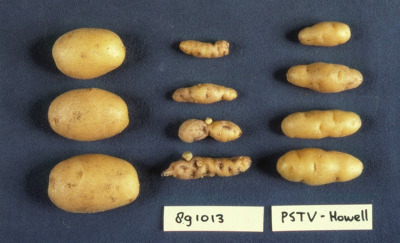What is a viroid?
1 Answer
An infectious particle that consists only of an extremely small circular RNA (ribonucleic acid) molecule and lacking the protein coat of a virus.
Explanation:
Viroids appear to be transmitted mechanically from one cell to another through cellular debris.
Viroids were originally thought to be either the evolutionary beginnings or left overs of conventional viruses.
Viroids are considered molecular fossils of the RNA world postulated to have preceded our present world dominated by DNA and proteins.
They infect only plants but there are other but similar molecules that may infect animals but which are unknown at this time.
There are than 25 to 30 different viroids, with numerous variants in each type that have been identified.
Viroids are common plant pathogens which cause serious economic problems.
Potato spindle viroid disease: The first row is normal.


